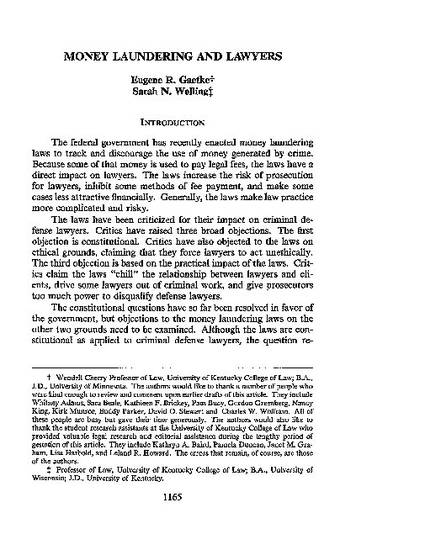
The federal government has recently enacted money laundering laws to track and discourage the use of money generated by crime. Because some of that money is used to pay legal fees, the laws have a direct impact on lawyers. The laws increase the risk of prosecution for lawyers, inhibit some methods of fee payment, and make some cases less attractive financially. Generally, the laws make law practice more complicated and risky.
The laws have been criticized for their impact on criminal defense lawyers. Critics have raised three broad objections. The first objection is constitutional. Critics have also objected to the laws on ethical grounds, claiming that they force lawyers to act unethically. The third objection is based on the practical impact of the laws. Critics claim the laws "chill" the relationship between lawyers and clients, drive some lawyers out of criminal work, and give prosecutors too much power to disqualify defense lawyers.
The constitutional questions have so far been resolved in favor of the government, but objections to the money laundering laws on the other two grounds need to be examined. Although the laws are constitutional as applied to criminal defense lawyers, the question remains whether that application is wise. Based on the laws’ ethical and practical impact, many claim that it is not. Nowhere in the literature have the laundering laws been analyzed in terms of their collective impact on criminal defense lawyers.
This article does that analysis. It begins by examining how the federal money laundering laws apply to criminal defense lawyers when they receive fees for their work. The article then explores whether and how the laws cause criminal defense lawyers to act unethically. The article next analyzes the practical impact of the laws on these lawyers. This article concludes that while the ethical criticisms of the laws are largely unfounded, there is legitimate, though as yet undocumented, concern about their practical impact on our criminal justice system.

Syracuse Law Review, Vol. 43, No. 4 (1992), pp. 1165-1245